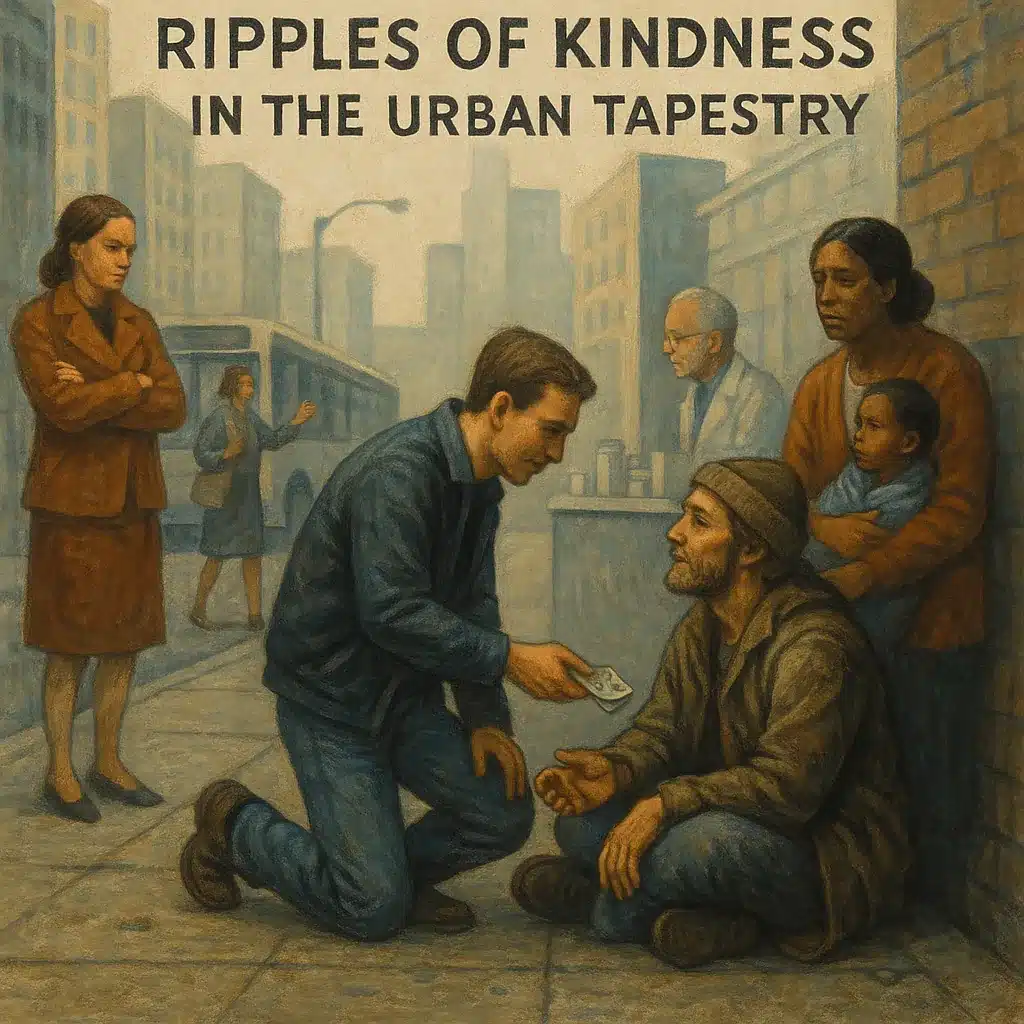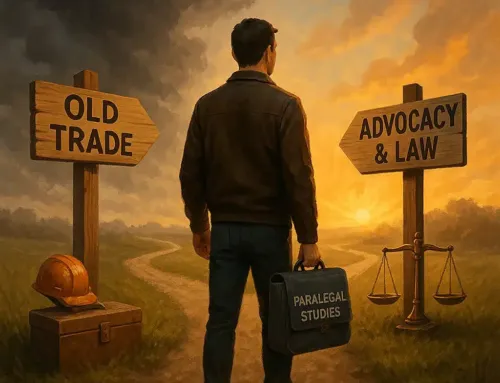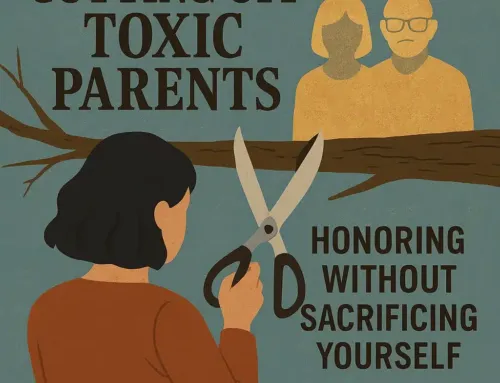
Approx. read time: 5.7 min.
Post: Ripples of Kindness in the Urban Tapestry
Ripples of Kindness in the Urban Tapestry
When empathy dares to echo through concrete canyons.
The city never sleeps. Its rhythm is relentless—horns blaring, feet pounding, voices overlapping in an endless hum of urgency. Beneath the blinking neon and scaffolding shadows, people pass each other like ghosts, heads down, hearts guarded.
And yet, within this sprawling grid of indifference, moments of humanity break through—quiet, fleeting, powerful.
On a brisk morning along a downtown avenue, a man sat hunched against the cold façade of a bank building. His jacket was worn thin, his beard flecked with ash and memory. He extended a trembling hand to the tide of pedestrians.
“Can you spare any change?” he asked, his voice barely cutting through the wind and engines.
A sharply dressed woman stopped. Her eyes narrowed—not in concern, but revulsion.
“Oh my god, did you just touch me?” she snapped, recoiling like she’d been burned. “Do you know how expensive this jacket is? I have to sanitize everything now.”
She turned on her heel, her heels clicking with finality as she muttered, “You wouldn’t understand. You’re homeless.”
And just like that, he was invisible again.
The noise of the city resumed. But within the man, silence fell—a silence heavier than steel, colder than winter. Shame stung his eyes, and he looked away from the crowd, as if he could fold into the bricks themselves.
Moments passed.
Then, a softer voice rose behind him.
“Hey, man. You didn’t deserve that.”
The speaker was young, maybe late 20s, hoodie zipped up, hands in pockets. He knelt slightly, handing over a crumpled bill.
“This is the most I’ve had in weeks,” the man whispered, his voice cracking. “Lunch and dinner today… I can eat. Thank you. God bless you.”
The stranger nodded, no theatrics, no sermon—just a smile, and then he was gone. But the gesture hung in the air like incense, a sacred interruption to a brutal rhythm.
A City’s Hidden Symphony
The scene could have ended there. But kindness, once set in motion, rarely ends where it begins.
Down the block, at a bus stop, a woman clutched a small handbag. Her hands trembled as she spoke to a man beside her.
“I just need two dollars to get to the clinic. My appointment… It’s important.”
The man’s eyes were skeptical, his voice edged with cynicism. “Yeah, right. I’ve heard it before.”
She looked down. “It’s okay. I’ll miss it. I’ve missed them before.”
But someone else had been listening. A college student with earbuds dangling from her neck stepped forward and offered the fare.
“You’re serious? You’ll do that?” the woman gasped, eyes wide.
“I’ve had people help me before. We all need someone sometimes.”
The woman caught her bus. Her tears weren’t just gratitude—they were the release of not having to fight the world alone, if only for a moment.
The Pharmacy
At a crowded corner drugstore, another ripple formed.
A mother stood at the register, her voice urgent.
“This is the medication the doctor said he needs today. He has asthma. I thought I had enough…”
The pharmacist shook his head. “I’m sorry. Without the full amount, I can’t process it.”
Her son, no older than seven, clutched her side, wheezing softly.
Behind her, impatient customers huffed, checked watches, shifted weight. One muttered under his breath, “People should come prepared.”
And then, a hand reached over the counter.
“I’ll cover it,” said a man, gray at the temples, briefcase still in hand. “Ring it up.”
The mother turned, overwhelmed. “Why would you do that?”
“Because I’ve been where you are,” he replied. “And someone did it for me.”
She clutched his hand like a lifeline. The pharmacist rang up the medication. The boy inhaled relief.
Chris and Hank
But the story’s most profound arc belonged to Chris and Hank.
Chris had noticed Hank weeks ago—a grizzled figure posted near the underpass, always offering a nod, never begging. Something about him was different. When Chris finally stopped one afternoon, he asked Hank if he needed anything.
“Just conversation,” Hank smiled.
Their talks became routine. Chris learned that Hank had once been an EMT, saving lives until a tragic chain of losses had unraveled everything—his wife, his job, his home.
And yet, Hank wasn’t bitter. He shared what little he had—a bottle of water with another homeless man, a warm jacket gifted by a shelter with a woman who had none.
“You give when you can,” Hank explained. “Even if it’s just dignity.”
Chris was moved. But nothing prepared him for what came next.
One evening, while telling his mother about Hank, she froze.
“What’s his full name?” she asked.
“Hank Reynolds,” Chris said.
Her eyes filled with tears. “He saved me. Years ago. Car accident on the freeway. Everyone else drove by—but he pulled me out before the fire spread. I never knew what happened to him.”
That night, Chris returned to the underpass.
“Hank… you saved my mom’s life.”
Hank smiled, eyes glossy. “Guess it came full circle.”
Chris helped Hank into a local program the following week—food, housing, and counseling. It wasn’t charity. It was a debt repaid with interest.
Weaving the Fabric of Compassion
This is not just a collection of moments.
This is the urban tapestry, woven not just of asphalt and noise, but of empathy and redemption. These ripples of kindness begin as small acts—an unexpected dollar, a gesture of belief, a hand reaching through despair—and they echo outward.
Each one connects us. Each one reminds us that beneath the veneer of roles and routines, we are bound by the same fragile hope—that someone sees us, hears us, believes we’re worthy of care.
Kindness is not weakness. It is rebellion in a world that often teaches us to look away. And it is within each of us to set a ripple in motion.
Related Videos:
Related Posts:
The Power of Love: Rediscovering What We’ve Lost and How to Reclaim It Daily
Echoes of the Past: Tracing the Historical Roots of Palestine and the Legacy of the Canaanites
Top 10 Lessons I Believe Parents Should Teach Their Kids for Wisdom, Happiness, and a Better Life
What Could I Do More Of? A Journey to Better Myself (And Probably You, Too)
Embracing Compassion: A Call to Be Kind in Supporting Mental Health
Why Do Mothers Get Blamed for Everything That Goes Wrong in a Family?
Why Do Mothers Get Blamed for Everything That Goes Wrong in a Family?
The Human Equation: Why Understanding People is the Key to Business Success










